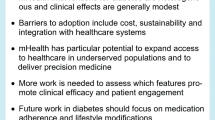Abstract
Background
Diabetes is becoming a very important health issue in rapidly developing nations and there is an urgent need to improve overall diabetes self-management education in these countries. Although e-health is an emerging theme, only a few successful web-based studies on diabetes self-management have been reported.
Purpose
We describe the development, implementation, and process evaluation of an Internet-delivered dietary intervention program (myDIDeA) for diabetic patients in a developing country.
Method
Specific dietary components to be included in the intervention module were first identified through a comprehensive review of literature and guidelines. The lesson plans and the study website were then developed based on the evidence, Transtheoretical Model’s Stages of Change and user-centered design approach. Finally, the effectiveness of the website was tested through a randomized-controlled trial to promote dietary change in patients with type 2 diabetes. The participants in the intervention group (n = 66) were given access to myDIDeA for 6 months. Process evaluation in form of intervention adherence and program reception were conducted at post intervention.
Results
The response rate for the process evaluation was 89 %. On average, each participant logged in at least once for each lesson plan and spent almost 12 min on the site. The participants’ content satisfaction, acceptability, and usability scores were satisfactory. The primary outcome of the trial, Dietary Knowledge, Attitude, and Behavior score was strongly correlated with content satisfaction (r = 0.826, p < 0.001), acceptability (r = 0.793, p < 0.001) and usability of the website (r = 0.724, p < 0.001), and moderately correlated with frequency of log-in (r = 0.501, p < 0.05) and duration spent in the website (r = 0.399, p < 0.05).
Conclusion
The process evaluation of myDIDeA demonstrates its feasibility, and future studies should identify the possibility of extending the use of Internet-based intervention programs to other health behaviors and issues related to self-management of chronic conditions. In addition, interactivity, peer support via social media, and other means to stimulate the interest of participants can be explored.

Similar content being viewed by others
References
International Diabetes Federation. IDF diabetes atlas. 6th ed. Brussels: International Diabetes Federation; 2013.
Ismail N. The nutrition and health transition in Malaysia. Public Health Nutr. 2002;5(1A):191–5.
NHMS IV. The future of diabetes in Malaysia. Keynote address. Malaysian Diabetes Educators Society Seminar 2012.
NHMS III. The third national health and morbidity survey (NHMS III) 2006. Kuala Lumpur: Institute for Public Health; 2008.
Oldenburg B, Absetz P, Chan CKY. Behavioral interventions for prevention and management of chronic disease. In: Steptoe K, Freedland JR, Jenning M, Lllabre S, Manuck, Susman E, editors. Handbook of behavioral medicine: methods and applications. New York: Springer; 2010. p. 969–88.
Ministry of Health and Academy of Medicine of Malaysia. Malaysian clinical practice guidelines: Management of type 2 diabetes mellitus (4th Edition) 2009. Available from: http://www.acadmed.org.my/view_file.cfm?fileid=292.
Azimah MN, Radzniwan R, Zuhra H, Khairani O. Have we done enough with diabetic education? A pilot study. Malacol Fam Physician. 2010;5(1):24–30.
Swinburn BA, Metcalf PA, Ley SJ. Long-term (5-year) effects of a reduced-fat diet intervention in individuals with glucose intolerance. Diabetes Care. 2001;24(4):619–24.
Watanabe M, Yamaoka K, Yokotsuka M, Tango T. Randomized controlled trial of a new dietary education program to prevent type 2 diabetes in a high-risk group of Japanese male workers. Diabetes Care. 2003;26(12):3209–14.
Yasin S, Chan CKY, Reidpath D, Allotey P. Contextualizing chronicity: a perspective from Malaysia. Glob Health. 2012;8:4–9.
Ramadas A, Quek KF, Chan CKY, Oldenburg B. Web-based interventions for the management of type 2 diabetes mellitus: a systematic review of recent evidence. Int J Med Inform. 2011;80(6):389–405.
Ramadas A, Quek KF, Chan CKY, Oldenburg B, H. Z. Randomised-controlled trial of a web-based dietary intervention for patients with type 2 diabetes mellitus: study protocol of myDIDeA. BMC Publ Health. 2011;11(359).
Boutron I, Moher D, Altman DG, Schulz KF, Ravaud P, Group ftC. Extending the CONSORT Statement to randomized trials of nonpharmacologic treatment: explanation and elaboration. Ann Intern Med. 2008;148(4):295–309.
Nield L, Moore HJ, Hooper L, Cruickshank JK, Vyas A, Whittaker V, et al. Dietary advice for treatment of type 2 diabetes mellitus in adults. Cochrane Database Syst Rev. 2007;18(3):CD004097.
Davi G, Santilli F, Patrono C. Nutraceuticals in diabetes and metabolic syndrome. Cardiovasc Ther. 2010;28(4):216–26.
National Diabetes Institute. Dietary management. 2003 [April 7, 2011]; Available from: http://www.nadidiabetes.com.my/nadimgr20da.html?xsection=complications&xdate=20020617&xname=article2.
Malaysian Dietitians’ Association, Ministry of Health. Malaysian medical nutrition therapy for type 2 diabetes. Malaysian Dietitians’ Association, 2005.
American Diabetes Association. Nutrition recommendations and interventions for diabetes: a position statement of the american diabetes association. Diabetes Care. 2008;31(Supplement 1):S61–78.
Prochaska JO, DiClemente CC. Stages and processes of self-change of smoking: toward an integrative model of change. J Consult Clin Psychol. 1983;51(3):390–5.
Davis F. Perceived usefulness, perceived ease of use and user acceptance of information technology. MIS Q. 1989;13(3):319–40.
Lazar J. User-centered web development. Massachusetts: Jones & Bartlett Publishers; 2001.
Kendra C. Stages of change - How to keep a resolution. 2010 [14 April 2010]; Available from: http://psychology.about.com/od/behavioralpsychology/ss/behaviorchange.htm.
Ramadas A, Chan CKY, Quek KF, Zanariah H, Oldenburg B. Validation of a knowledge, attitude, and behavior questionnaire for dietary education in Malaysian diabetic patients. Int J Behav Med. 2010;17(Suppl 1).
Samoocha D, Snels IA, Bruinvels DJ, Anema JR, Kowalczyk W, van der Beek AJ. Process evaluation of a web-based intervention aimed at empowerment of disability benefit claimants. BMC Med Inform Decis Mak. 2011;11.
Wantland JD, Portillo JC, Holzemer LW, Slaughter R, McGhee ME. The effectiveness of web-based vs. non-web-based interventions: a meta-analysis of behavioral change outcomes. J Med Internet Res. 2004;6(4):e40.
Macniven ROB, Shilton T, Bauman A. The initial development and process evaluation of AusPAnet: the Australian physical activity network. Health Promot J Aust. 2008;19:36–9.
Papadaki A, Scott JA. Process evaluation of an innovative healthy eating website promoting the Mediterranean diet. Health Educ Res. 2006;21(2):206–18.
Steele R, Mummery KW, Dwyer T. Development and process evaluation of an Internet-based physical activity behaviour change program. Patient Educ Couns. 2007;67(1–2):127–36.
McConnon Á, Kirk SFL, Ransley JK. Process evaluation of an internet-based resource for weight control: use and views of an obese sample. J Nutr Educ Behav. 2009;41(4):261–7.
Acknowledgments
The author (AR) of this publication was supported by the ASCEND Program (www.med.monash.edu.au/ascend) funded by the Fogarty International Centre, National Institutes of Health, under Award Number D43TW008332. The contents of this publication are solely the responsibility of the authors and do not necessarily represent the official views of the National Institutes of Health or the ASCEND Program. The authors would also like to thank the Director of Health Malaysia for permission to publish this paper.
Funding
This study was supported by Seed Grant (MED2009-CM(SG)-004-QKF) funded by Monash University Malaysia.
Conflict of Interest
The authors—Amutha Ramadas, Quek Kia Fatt, Brian Oldenburg, Zanariah Hussein and Carina Ka Yee Chan—declare that they have no conflict of interest.
Human Rights Statement
All procedures followed were in accordance with the ethical standards of the responsible committee on human experimentation (institutional and national) and with the Helsinki Declaration of 1975, as revised in 2000 and 2008.
Author information
Authors and Affiliations
Corresponding author
Additional information
Trial registration: Clinicaltrials.gov NCT01246687
Rights and permissions
About this article
Cite this article
Ramadas, A., Chan, C.K.Y., Oldenburg, B. et al. A Web-Based Dietary Intervention for People with Type 2 Diabetes: Development, Implementation, and Evaluation. Int.J. Behav. Med. 22, 365–373 (2015). https://doi.org/10.1007/s12529-014-9445-z
Published:
Issue Date:
DOI: https://doi.org/10.1007/s12529-014-9445-z




